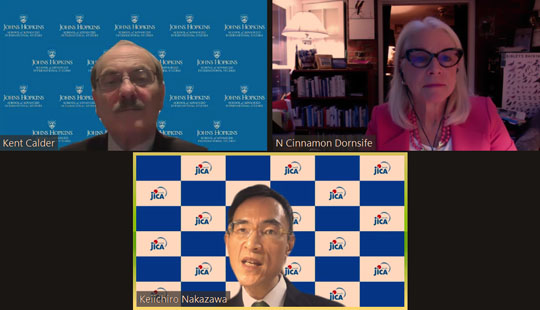JICA Senior Vice President Nakazawa Discusses "COVID-19, The Developing World, and East Asia's Response" During Webinar Hosted by Johns Hopkins School of Advanced International Studies (SAIS)
Day:2020.08.26
event |
On August 26, 2020, Mr. Keiichiro NAKAZAWA, JICA Senior Vice President, took part in a webinar entitled, "SHADOWS: COVID-19, The Developing World, and East Asia's Response," which the Johns Hopkins School of Advanced International Studies (SAIS) hosted and Professor Kent CALDER, Director of the Reischauer Center for East Asian Studies at SAIS, moderated. Mr. Nakazawa focused his remarks on the evolution of the COVID-19 outbreak in India; how India and other developing countries are responding to the pandemic; as well as JICA's new global initiative to promote health and medicine. During the Q&A session, he also highlighted Japanese experiences in dealing with COVID-19, emphasized the importance of prevention including through daily practices, and explained JICA's approach to tackling challenges brought about by COVID-19 in developing countries. Ambassador Cinnamon DORNSIFE, Senior Advisor of International Development at SAIS and a former U.S. Ambassador and U.S. Executive Director to the Asian Development Bank (ADB), joined the discussion and spoke about COVID-19 responses by International Financial Institutions (IFIs).
Mr. Nakazawa started off by sharing his concern that despite significant progress in poverty reduction over the last few decades, particularly in Asia, COVID-19 may have already driven as many as 100 million people back into extreme poverty. In the case of India, Mr. Nakazawa observed that Prime Minister Modi was early in announcing a national lockdown, but it has severely impacted the livelihoods and even safety of vulnerable people such as rural migrants and informal sector workers. He then pointed out that JICA has provided much-needed budgetary support to India and made earlier critical investments in healthcare infrastructure along with human resources development in Vietnam and Ghana through technical cooperation programs and grant funding to establish a medical institution.
Dr. Dornsife noted that global GDP growth is expected to contract by 5.6% this year and opined that well-governed institutions like the IFIs can help manage the large-scale stimulus spending that countries are undertaking to counteract economic fallout from the pandemic. She also made reference to CSIS's tracker of IFIs' COVID-19-related financial commitments, which amount to USD 175 billion to date. She added that civil society organizations (including think-tanks) have an important role in ensuring accountability of COVID-19-related stimulus spending. She concluded her remarks by emphasizing the importance of sustainable development and referenced a World Economic Forum report on the future of nature and business showing that the right investments in nature could create a stronger economic future.
To conclude the webinar, Mr. Nakazawa poignantly suggested that the pandemic is a wake-up call for the world to unite.

First row: Professor Kent Calder (left) and Ambassador Dornsife (right)
Second row: Mr. Keiichiro Nakazawa
scroll